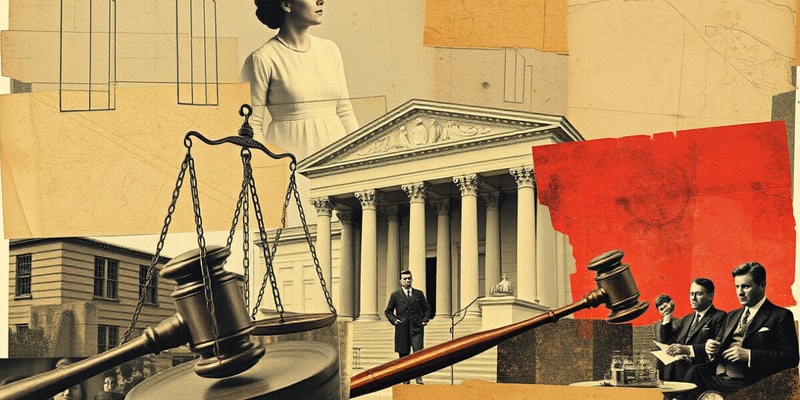Questions and Answers
What is the primary function of the adversary system in court cases?
Which scenario would prevent a court case from being heard under the adversary system?
In the context of the adversary system, what is a plaintiff's essential role?
What dictates the arguments made by parties in the adversary system?
Signup and view all the answers
What must a plaintiff do to successfully carry its burden of persuasion?
Signup and view all the answers
What is a likely consequence if a plaintiff fails to argue for the defendant's liability?
Signup and view all the answers
In adversary system cases, what must define the parties involved?
Signup and view all the answers
How does the adversary system theoretically guarantee the truth is discerned?
Signup and view all the answers
What foundational requirement must be met for a case to be heard in the adversary system?
Signup and view all the answers
Which aspect of the adversary system is critical in determining the arguments presented by the parties?
Signup and view all the answers
What must a plaintiff do to secure a favorable outcome in an adversary system case?
Signup and view all the answers
In what way does the adversary system operate to reveal the truth in court proceedings?
Signup and view all the answers
How do the roles of the plaintiff and defendant define their arguments in the adversary system?
Signup and view all the answers
What is one unavoidable outcome for plaintiffs in the adversary system if they do not argue for the defendant's liability?
Signup and view all the answers
Which statement best describes the obligations of each party involved in the adversary system?
Signup and view all the answers
What is a necessary condition for a case to be decided within the framework of the adversary system?
Signup and view all the answers
Study Notes
The Adversary System Overview
- The adversary system serves as a sorting mechanism in the judicial process, helping to clarify positions and legal principles in disputes.
- Court cases are conducted under the adversary system, where parties with opposing interests present their cases before a judge.
Mechanism of Conflict Resolution
- Each party presents its arguments forcefully, allowing the judge to discern the truth through the clash of opposing viewpoints.
- A fundamental principle is that the parties must be adverse; if both parties agree, there is no dispute to resolve.
Roles of Plaintiff and Defendant
- The plaintiff advocates for any arguments that lead to the defendant's liability, while the defendant opposes these arguments.
- This dynamic ensures that each side engages with the relevant legal and factual issues central to the case.
Requirement of Adversity
- Party adversity is essential for identifying the presumptive arguments each side will make in a case.
- The plaintiff's obligation is to always counteract the defendant’s arguments against liability, focusing solely on establishing grounds for imposing liability.
Burden of Persuasion
- The plaintiff must effectively make arguments that support findings of liability; failure to do so results in losing the case.
- The effective presentation of arguments is crucial for the plaintiff to fulfill their burden of persuasion in court.
The Adversary System Overview
- The adversary system serves as a sorting mechanism in the judicial process, helping to clarify positions and legal principles in disputes.
- Court cases are conducted under the adversary system, where parties with opposing interests present their cases before a judge.
Mechanism of Conflict Resolution
- Each party presents its arguments forcefully, allowing the judge to discern the truth through the clash of opposing viewpoints.
- A fundamental principle is that the parties must be adverse; if both parties agree, there is no dispute to resolve.
Roles of Plaintiff and Defendant
- The plaintiff advocates for any arguments that lead to the defendant's liability, while the defendant opposes these arguments.
- This dynamic ensures that each side engages with the relevant legal and factual issues central to the case.
Requirement of Adversity
- Party adversity is essential for identifying the presumptive arguments each side will make in a case.
- The plaintiff's obligation is to always counteract the defendant’s arguments against liability, focusing solely on establishing grounds for imposing liability.
Burden of Persuasion
- The plaintiff must effectively make arguments that support findings of liability; failure to do so results in losing the case.
- The effective presentation of arguments is crucial for the plaintiff to fulfill their burden of persuasion in court.
Studying That Suits You
Use AI to generate personalized quizzes and flashcards to suit your learning preferences.




